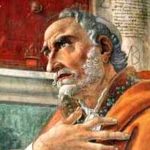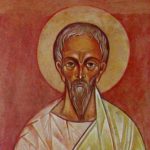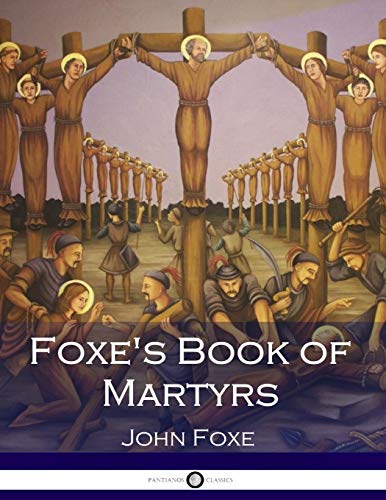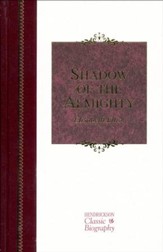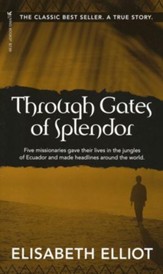Quotes about Martyrdom
If there be glory laid up for them that die in the Lord; much more shall they be glorified that die for the Lord.
A Puritan Golden Treasury, compiled by I.D.E. Thomas, by permission of Banner of Truth, Carlisle, PA. 2000, p. 53.
Most of the disciples were martyred for their faith. But none of them recanted their affirmation in order to save their lives. Someone surely would have done so if they had even a doubt that the Resurrection was not true.
The Evidence for the Resurrection by Ajith Fernando taken from The Supremacy of Christ by Ajith Fernando, copyright 1995, Crossway Books, a division of Good News Publishers, Wheaton Illinois 60187, www.crosswaybooks.org, p. 254.
After the respite, the Christians again came under persecution, this time from Marcus Aurelius, in A.D. 61. One of those who suffered this time was Polycarp, the venerable bishop pf Smyrna… As he entered the stadium with his guards, a voice from heaven was heard to say, “Be strong, Polycarp, and play the man.” No one nearby saw anyone speaking but many people heard the voice. Brought before the tribunal and the crowd, Polycarp refused to deny Christ, although the proconsul begged him to “consider yourself and have pity on your great age. Reproach Christ and I will release you.” Polycarp replied, “Eighty-six years I have served Him, and He never once wronged me. How can I blaspheme my King, who saved me?” Threatened with wild beasts and fire, Polycarp stood his ground.
The Church of Christ has been founded by shedding its own blood, not that of others; by enduring outrage, not by inflicting it. Persecutions have made it grow; martyrdoms have crowned it.
No one makes us afraid or leads us into captivity as we have set our faith on Jesus. For though we are beheaded, and crucified, and exposed to beasts and chains and fire and all other forms of torture, it is plain that we do not forsake the confession of our faith, but the more things of this kind which happen to us the more are there others who become believers…through the name of Jesus.
No one makes us afraid or leads us into captivity as we have set our faith on Jesus. For though we are beheaded, and crucified, and exposed to beasts and chains and fire and all other forms of torture, it is plain that we do not forsake the confession of our faith, but the more things of this kind which happen to us the more are there others who become believers and truly religious through the name of Jesus.
We do not know the value of Christ, if we will not cleave to Him unto death!
The martyrs shook the powers of darkness with the irresistible power of weakness.
Authentic, biblical Christianity has always been an exclusive religion. This became apparent during the Roman Empire. When the Emperor Alexander Severus heard about Christianity, he placed an image of Christ beside the other gods in his private chapel, just to be safe. The Romans were happy to welcome Jesus into their pantheon. What the Romans couldn’t understand was why Christians refused to reciprocate. If the emperor was willing to worship Christ, why weren’t Christians willing to worship the emperor? Yet the early Christians insisted that in order to worship Christ at all, they had to worship Christ alone. They were even willing to stand up for this conviction by playing “Christians and lions” at the Colosseum.
What is the worst the opposition can do? Kill you – though doubtless that will occur, at least for now, in this country. But even if that were case, the Scripture strips away that excuse citing that death for the Christian is the greatest event possible because only death has the ability to break the seal and usher you into inexpressible glory. Could the problem be that we simply have a too great a fascination with the things going on here and not enough desire to spend eternity with Christ? If we really “prefer” to be “home with the Lord” (2 Cor. 5:8), intimate, personal, visible communion with Christ that far exceeds our communion with Christ here (Heb. 11:10, 13), then we must be “absent from the body” (2 Cor. 5:8). In other words, we must die. Therefore death from that perspective doesn’t sound so bad. Only death can release me from “absent from the Lord” to be “home with the Lord.” So the worst the enemy can do is send me to paradise!
Never did the church so much prosper and so truly thrive as when she was baptized in the blood. The ship of the church never sails so gloriously along as when the bloody spray of her martyrs falls on her deck. We must suffer and we must die, if we are ever to conquer this world for Christ.
The blood of the martyrs is the seed of the Church
Matthew suffered martyrdom by being slain with a sword at a distant city of Ethiopia.
Mark expired at Alexandria, after being cruelly dragged through the streets of that city.
Luke was hanged upon an olive tree in the classic land of Greece.
John was put in a cauldron of boiling oil, but escaped death in a miraculous manner, and was afterward banished to Patmos.
Peter was crucified at Rome with his head downward.
James, the Greater, was beheaded at Jerusalem.
James, the Less, was thrown from a lofty pinnacle of the temple, and then beaten to death with a fuller’s club.
Bartholomew was flayed alive.
Andrew was bound to a cross, whence he preached to his persecutors until he died.
Thomas was run through the body with a lance at Coromandel in the East Indies.
Jude was shot to death with arrows.
Matthais was first stoned and then beheaded.
Barnabas of the Gentiles was stoned to death at Salonica.
Paul, after various tortures and persecutions, was at length beheaded at Rome by the Emperor Nero.
The problem with Christians is nobody wants to kill them anymore.
A Christian Martyr is one who: Chooses to suffer death rather than to deny Christ, or His work… Sacrifices something very important to further the Kingdom of God…Endures great suffering for Christian Witness.
